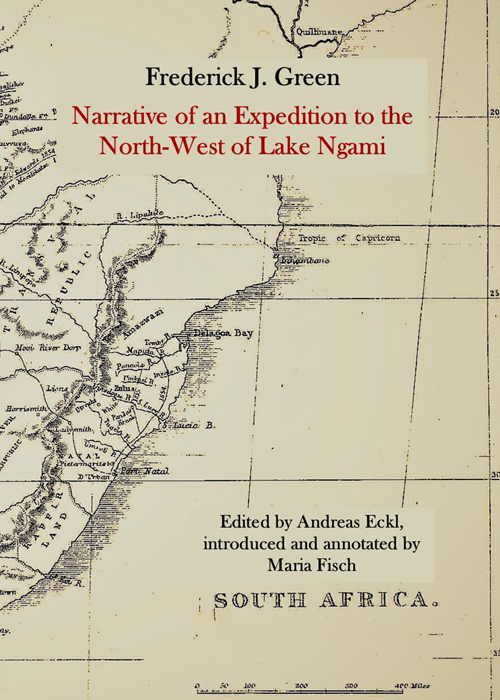Frederick J. Green
Narrative of an Expedition to the North-West of Lake Ngami, extending to the capital of Debabe’s Territory, via Souka River, hithero an unexplored portion of Africa
Ed. by Andreas Eckl, introduced and annotated by Maria Fisch
Broschur, 15 x 21 cm, 103 Seiten
Bochum, Januar 2022
ISBN 978-3-939886-09-9
17,80 EUR


Frederick Joseph Green
Frederick Joseph Green (1829-1876) wurde in Kanada geboren. Über seine Jugend ist nur wenig bekannt. In den 1840er Jahren wanderte er mit seinem Vater Robert und den zwei Brüdern Henry und Charles Alexander nach Südafrika aus. Sein Vater und Henry erhielten dort Arbeit in gehobenen Stellungen. Frederick und sein jüngerer Bruder Charles zogen 1850 nach Bechuanaland und starteten das unruhige Leben als Händler und Jäger. Frederick jagte mit einem Pferd oder aus einem Verschlag in der Nähe von Wasserstellen. Er war einer der berühmtesten Jäger Afrikas, der angeblich mehr als 750 Elefanten getötet hat.
1855 wollte Green unbedingt erreichen, was Charles Andersson im Jahr davor nicht geglückt war: er wollte als erster Europäer zur Residenz Diyeves gelangen, dem sagenumworbenen „Regenmacher“. Sein Plan ging sogar noch weiter. Vom Oberlauf des Thaoge wollte er weiter flussaufwärts vordringen und die Möglichkeit erforschen, ob es eine Wasserverbindung zum Kunene und somit einen Zugang vom Landesinneren zum Atlantischen Ozean gäbe. Zur Ausführung seines Planes ließ Green in Cape Town ein großes Holzboot von 18 Fuß Länge und 6 Fuß Breite bauen, per Schiff nach Walvis Bay und von dort per Ochsenwagen zum Lake Ngami bringen. Am 25. August 1855 konnte Green mit seinen Reisebegleitern schließlich die Expedition beginnen.
Auszug aus dem Inhalt
The accounts of the distance from this point to Debabes, as stated by the Bakuba, were, that we should still have to journey by water at least three moons, and to travel by land it was but eight days. They likewise informed us that there were rapids and extensive falls further up the river, where our progress with the boat would be completely obstructed. With such impediments, we deemed it the most prudent plan to complete the journey on foot as far as the capital of Debabe’s territory, all hopes of reaching the coast being thus defeated. We accordingly resolved on our plans, and applied to a Bakuba chief whose village was on the opposite bank of the river, for four men to assist our conveying such necessaries as we should require for the journey on foot; but he evidently seemed afraid of incurring the displeasure of a tyrannical chief, Lachuletabe, by complying with our request. We had already engaged three men to proceed with us, but they dared not accompany us contrary to the orders of their chief. We therefore decided upon carrying the things ourselves, after limiting them to the very lowest weight we possibly could for such an undertaking. The prospect of carrying our own bundles, and travelling from twenty to thirty miles per diem in the excessive heat of the weather, was anything but agreeable; and as a last resource to procure people, we sent for the chief and told him that should anything happen to us that he alone would be responsible to Lachuletabe , and being friends of the latter chief, his lord and master, that he would certainly be killed if we did not return with safety through his dominions. This had the desired effect, and we were happy in seeing four men immediately at our disposal; indeed, I have no hesitation in saying that, had anything serious befallen us through a Bakuba chief refusing us [318] assistance, that the unfortunate slave would suffer death – so little does Lachuletabe account the life of a Bakuba, – although in aiding us without the sanction of the chief they actually tremble for the consequences. It is astonishing what power this chief has over the Bakuba and Bushmen tribes , and how far his dominion extends to the north and westward, though his own people are but a handful compared to the numbers that those other tribes comprise.
Karte aus: Aurel Schulz & August Hammar, The New Africa. Journey up the Chobe and down the Okovanga Rivers. A Record of Exploration and Sport, London, 1897:
Nördlicher Teil / northern part
Südlicher Teil / southern part
